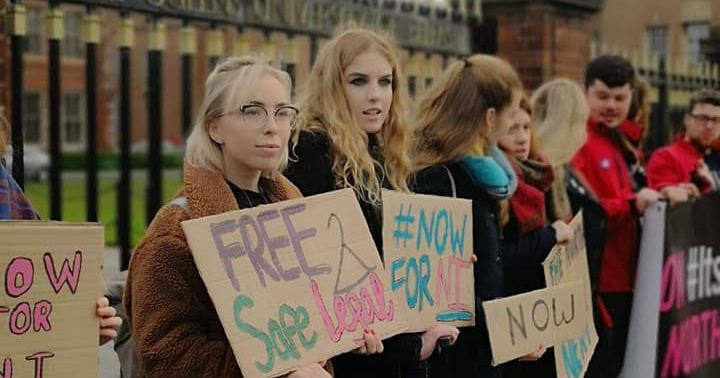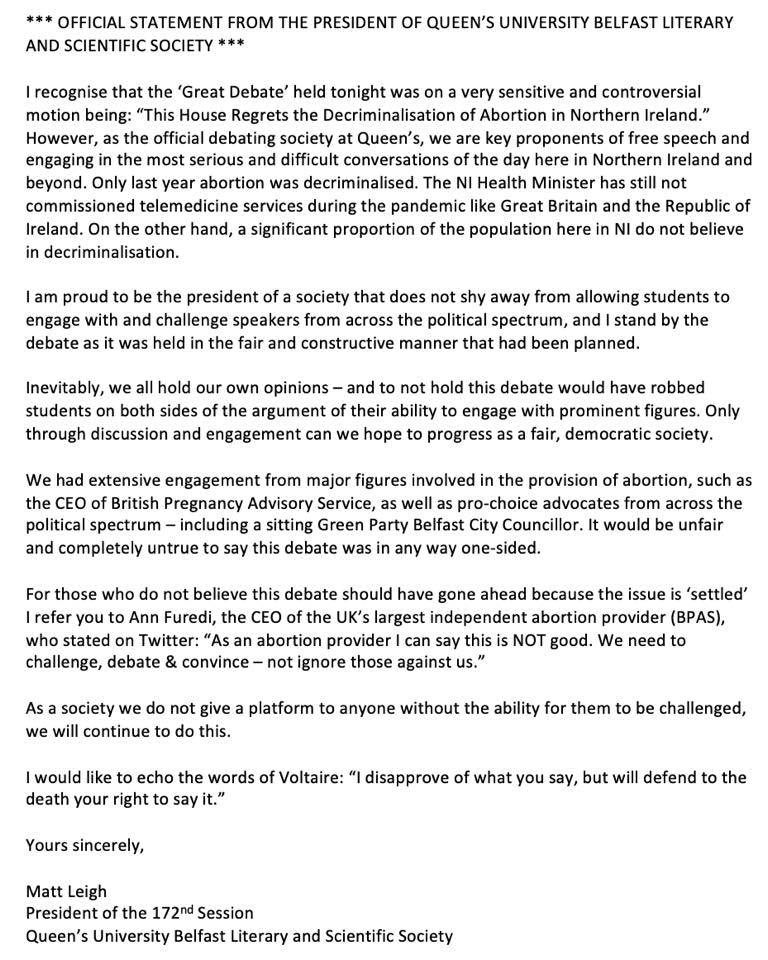
QUB debating society have problematically platformed Ann Widdecombe
*scrolls through notes* Why though?
On Monday evening, Queen’s University Belfast’s debating society, The Literific, held an online debate called ‘This House Regrets Decriminalisation of Abortion in Northern Ireland.’
The debate took place in response to the one year anniversary of the law on abortion in Northern Ireland being changed. Until October 2019, it was a criminal offence until a bill in the UK Parliament was passed during the suspension of the Northern Ireland Assembly.
The Literific is one of QUB’s most well-established societies, boasting debates which are attended by a diverse array of people, with Monday’s event being no exception.
However, with former MEP Ann Widdecombe speaking at the decriminalisation debate, many students found themselves recoiling. The livestream received over 500 comments.
Platforming Ann Widdecombe was an uncomfortable part of the debate due to her track record of untenable and harmful positions, that represent only a small minority of socially conservative views.
This, along with Widdecombe’s star power as a former Strictly contestant, makes the decision to amplify her voice even more irresponsible.
The ex-politician has had a long-spanning career in British politics, having been first elected as a Conservative MP in 1987, remaining there until 2010. Under William Hague’s Conservative Party, she was Shadow Home Secretary and in 2019 she joined the Brexit Party, serving them as an MEP for six months.
Widdecombe is known for having some hot takes. And by hot takes, I mean deeply problematic views that put vulnerable people in our communities at risk.
Widdecombe has previously supported a comment made by Conservative MP, Jacob Rees-Mogg, who claimed abortion was morally wrong even in extreme cases, such as rape.

Abortion has been a heavily debated issue across campus even after it was decriminalised
Speaking at the debate, she said that “the law which has now been imposed – I can’t put it any other way – on Northern Ireland is a law that actually is illogical.”
She added that, “nothing has happened to change that [unborn] child into something different [after it is born] other than the fact that finally it can be seen” because it is still “the same child.”
Ironically, though, she disputes that climate change exists because she can’t see it.
In addition, Widdecombe has previously voiced support for Queer conversion therapy, making explicit racist remarks, and choosing to share a platform with Holocaust deniers.
Criticising the debate, Queen’s University Belfast Student’s Union (QUBSU) Women’s Officer Jill McManus, said that “the choice to include Ann Widdecombe as their star speaker betrays that this debate is not truly about the nuances of abortion in Northern Ireland”.
She added that she appreciates “that people may feel they want access to abortion care discussed further. However, the views held by Ann Widdecombe, Peadar Tóibín, and Carla Lockhart [who also spoke at the event] are not reflected by the views of the public in Northern Ireland. The NI Life and Times Survey showed that 71% of those surveyed agree or strongly agree it is a woman or a pregnant person’s right to choose whether or not to have an abortion, and even 80% of DUP voters favoured abortion law reform.”
Given that so few people share Widdecombe’s extreme views on abortion, it feels reckless that she was able to share her misleading views on such a well-established platform.

The debate still takes place, but why are problematic voices being platformed?
The debate could have been sufficiently covered without her harmful contributions and by platforming her opinions, they became legitimised by others on the panel.
Another panellist on the deceivingly ‘pro-life- platform announced how he made a “moral” argument against abortion. And, reader, let me tell you that even Russell Brand could not muster the philosophical pontification that soon departed his lips.
By not ascribing an unborn child personhood, he said, we can compare abortion to those who died during the Holocaust. As a Jewish person listening in to the debate, all I can say is, erm, yikes! This point wasn’t then given time to be challenged and was just left hanging there, legitimised, highlighting just how problematic this debate was.
Whilst the free speech that The Literific rightly advocates for is important, this does not mean that harmful views, such as those held by Widdecombe, should be tolerated.
Queen’s University Belfast Project Choice released a statement on Twitter which said that “we reiterate our position that the bodily autonomy of women and pregnant people should never be up for debate.”
Tara Ní Chonghaile, A QUB graduate tweeted that “somewhere there’s a balance between free speech and handling incredibly sensitive topics carefully and constructively? I don’t see why it’s all one thing or the other?”
In reality, Widdecombe’s views represent a mere minority and many students feel angry that they were allowed to be disproportionately amplified.

The Literific made a statement on the event, shortly after it took place on Monday evening
In a statement after the event, Matt Leigh, the President of The Literific said that “as a society we do not give a platform to anyone without the ability for them to be challenged. We will continue to do this.”
By platforming such harmful panellists into campus politics, all eyes will now be on The Literific to stay to their word.
The Belfast Tab contacted Ann Widdecombe, QUB and QUBSU to comment on this matter.









































